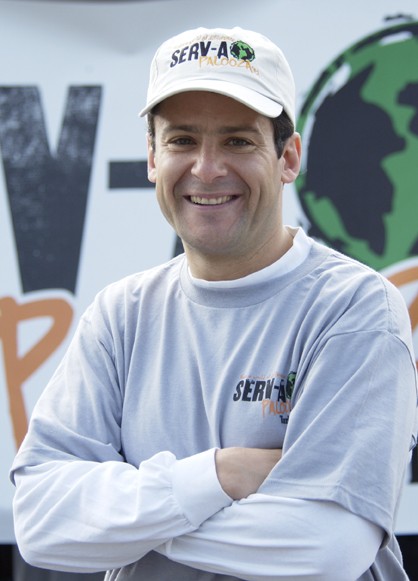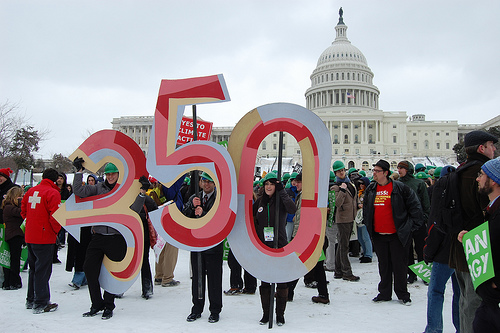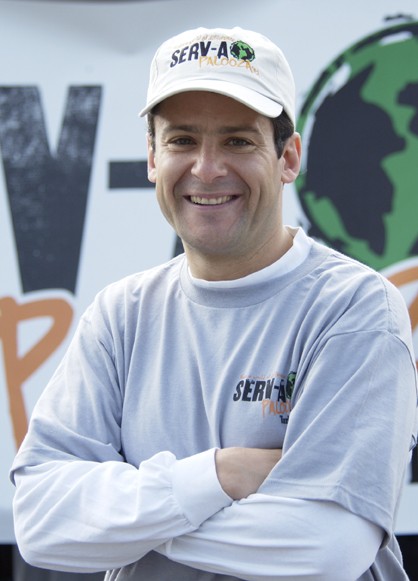 Timberland CEO Jeff SwartzPhoto: TimberlandCould corporate America finally be stirring from its climate change slumber? Timberland CEO Jeff Swartz believes the answer is a qualified yes. If recent events are any indication, we’re inclined to agree with him.
Timberland CEO Jeff SwartzPhoto: TimberlandCould corporate America finally be stirring from its climate change slumber? Timberland CEO Jeff Swartz believes the answer is a qualified yes. If recent events are any indication, we’re inclined to agree with him.
In the last few weeks companies from Apple and Nike to Pacific Gas and Electric have been deserting the 97-year-old Chamber of Commerce over its “climate-change-what-climate-change?” stance on climate change. This week, as part of an advocacy effort called We Can Lead, CEOs from more than 150 corporations are swarming the Capitol to try and strong arm the Obama administration and congressional lawmakers into passing a long overdue climate change bill.
“For the United States to compete, you must act,” said CEOs from Starbucks, Nike, eBay, Timberland, and dozens of other American businesses in their letter to the president and congress.
We caught up with Timberland’s Jeff Swartz in the midst of the We Can Lead hoopla. As the CEO of his family’s business since 1998, Swartz has been outspoken and active on social and environmental issues. Here’s an edited version of our conversation about the cost and effect of climate change and what corporate America is and isn’t doing about it.
You convinced Timberland’s colleagues and competitors in the shoe and boot industry not to purchase leather from any tannery that fails to meet the group’s mutually agreed-upon set of environmental standards. Are there parallels to be drawn between leather and climate change legislation?
“Social change is going to require this association of millionaires and billionaires. You can have a marginal influence as a brand. But to create clear, universal change, we have to collaborate. [In the case of leather] the collaborative effort of competitors has changed the industry standard. Consumers can now discriminate. All the hard work on our side unilaterally couldn’t have compelled that change. There has to be equally principled partners at the table, and [when it comes to climate change legislation], the government hasn’t been a principled partner.
“The issue is pressing and it’s now. I went to Washington as part of the coalition because I believe that collaboration is leverage. I saw the incandescent lights in the [White House] meeting room, and the high flush toilets in the men’s room, and a flat screen television in the men’s room. This is abject failure to lead. I said [to a high level White House advisor], I don’t understand why we went from 20 to 17 percent [on 2020 emission cut targets in the Waxman-Markey energy bill], and she said, almost plaintively, ‘that’s not what we wanted.’ If you didn’t want to go from 20 to 17, and you have control of both houses and the executive branch, then why did you? I just want government to do its job.”
And what is government’s job as it relates to climate change legislation?
“Government should say here’s the social policy and nothing more. The CEO gets a social contract and it has a price on it. There is a cost. You have to be conscious of the environment whether you like it or not. But I don’t accept the argument that business is not innovative enough to find a way to respond to this social policy.”
How does the lack of specific climate legislation affect Timberland?
“I was on a panel in London with the CEO of Ikea. He was cool. He was talking about the outgassing of furniture. He said that Ikea does business in a lot of countries, and the number of different standards [for outgassing] is different from country to country. And I’m nodding my head. So he set their company standard at the highest level in hopes that nation-states would create a global accord. When that [accord] happens, the fact that Ikea has taken the highest standard first puts them at a competitive advantage. The Ikea CEO described it as a blend of passion, competitive spirit and principle. Absence of a comprehensive strategy on climate change is the absence of a consistent standard around the world. The lack of standards brings incredible uncertainties. [Without them,] the arbiter of social policy is me.
“Global agreement [on climate change policy] isn’t going to be a CEO agreement. It’s going be a high-level thing. It almost doesn’t matter what the number is. As bad as the bills are, I’m for it. I’m a huge believer in you don’t let the perfect be the enemy of the good. At Timberland, we’ve been reducing our greenhouse gases by more than 20 for the last three years. We did find a way to be competitive. It can be done.”
Given the fact that the U.S. Government has been dithering over climate change policy for a long time and that much of corporate American has been lobbying against it, why do you think this new We Can Lead corporate lobbying effort will change anything?
“I believe in the principle of coalition, in the urgency of the issue which is personal and corporate. Culturally, this conversation with the consumer citizen is reaching a point of cognitive clarity. It passes the brand awareness test. I also think that the social media phenomena has created a non-nation-state-bound consumer coalition, meaning there are things about green thinkers in Mumbai that I have more in common with than my investment bankers in New York. And there’s been an economic crisis. [Today] reuse is practical, recycle is purposeful and reduce is ethical. It’s been the right thing to do. Now it’s a personally important thing to do. The pain of this [economic] reset is really bad. But if you look through the pain, the eco-frugal mindset that is sharply appearing in consumers bodes well for our conversation. Consumer awareness, global connection, and economic crises set it up.”
As for CEO’s:
“If you keep telling yourself, ‘it’s only a movie, it’s only a movie,’ you’re heading for the scrap heap. This solar-powered electric train is making noise. It’s puffing. It’s getting ready to leave. You can fight to slow it down, although I’m not sure why you’d want to. But this one is in play.”
Are you advocating the kinds of major changes that carpet CEO Ray Anderson proposes in his new book Confessions of a Radical Industrialist: Profits, People, Purpose–Doing Business by Respecting the Earth?
“I absolutely believe in the power of hyperbole. It’s hugely important for someone [like Ray] to say, ‘it can’t be done? Let me show you how I did it.’ You don’t have to do [what Ray did]. But we’re sitting in the White House and you’re going to debate percentages. While you’re debating, could I have someone in facilities just change these light bulbs? If the first five percent [of climate change work] was not as hard as we thought, and if the second five percent isn’t as hard as we thought, then it becomes so easy that even a vice president can do it. That’s what we’re on the edge of.”
Beyond descending on Washington — and spending more than $1 million in this lobbying effort — what else is this new coalition of 150-plus businesses planning?
“This is a long march not a short sprint. We have real plans for Copenhagen that range from activism to consumer engagement. We’re trying really hard to find a place on the agenda for the CEO’s voice. We’re working with various coalitions to try and get red-blooded, hard-hitting CEOs in front of the delegates. The message we’re trying to pitch is don’t tell me it can’t be done. We can be responsible to our shareholders and responsible stewards of the environment.
“I would love to see the CEOs voice get there. In our heads the model is not a Greenpeace model. It’s not rappel in the window and give a speech. It’s get invited to make a speech. Right now no one’s inviting the CEOs to speak. We’re working really hard to get a seat at the table. That’s what we’re doing at the policy level.
“At the consumer level, we have 500 stores around the world. [Come December] all those windows should be about Copenhagen — aimed at saying we’re doing our part, you’re doing your part, let’s make sure our leaders do their part.”
Jeff Swartz also believes strongly that consumer demand shapes corporate practices, including environmental policies. In this video interview with Grist, Swartz explains how what consumers want is a potent force in the corporate boardroom.



